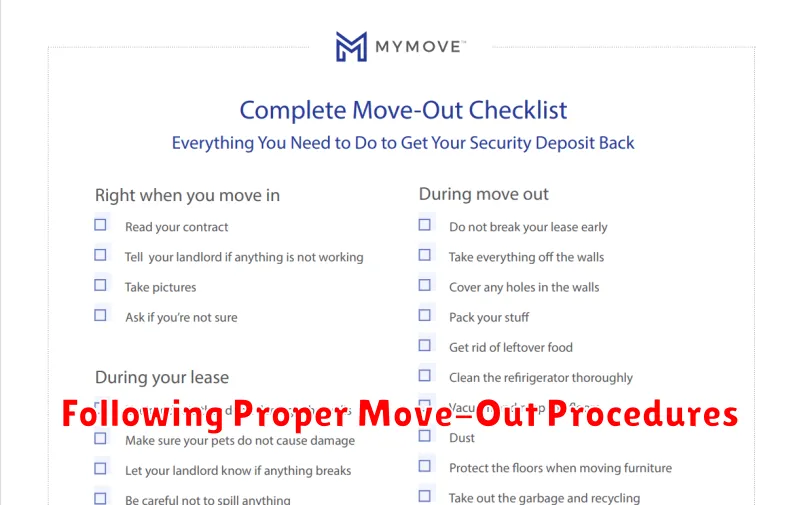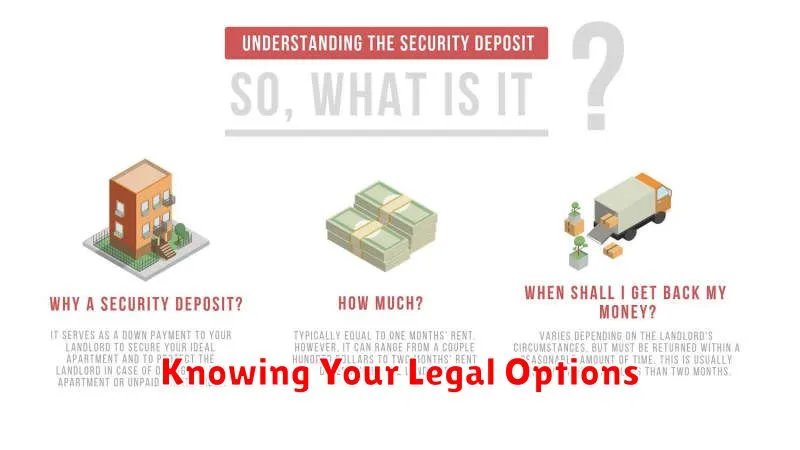Moving out of your apartment can be a stressful time, but one thing you shouldn’t have to worry about is getting your security deposit back. While most landlords are honest and will return your deposit with no issue, sometimes you might need to negotiate to get the full amount back. Whether you’re dealing with unfair deductions or just want to ensure you get everything you deserve, this guide will walk you through the process of negotiating your apartment security deposit refund.
Understanding Your Security Deposit Rights
A security deposit is a sum of money you pay to your landlord at the beginning of your tenancy. It is meant to cover any damages you may cause to the property during your stay. However, it is important to know that you are entitled to receive your deposit back when you move out, assuming you haven’t caused any damage.
Here are some key things to keep in mind about your security deposit:
- The amount of the deposit is typically one or two months’ rent, but this can vary depending on the state and the property.
- Your landlord must provide you with a written notice explaining the reasons for any deductions from your deposit.
- You should receive your deposit back within a specified time frame after you move out, which also varies by state.
- You have the right to challenge any deductions that you feel are unfair. You can negotiate with your landlord or even take legal action to get your deposit back.
Knowing your rights about your security deposit is an essential step in getting your money back when you move out. It’s best to review the terms of your lease and state laws to understand the specific requirements in your area.
Documenting the Apartment’s Condition
Before you move into your apartment, it’s crucial to document its condition. This includes taking photographs and videos of any existing wear and tear, damage, or issues. You’ll want to capture everything, from scratches on the walls to stains on the carpet. This documentation serves as crucial evidence when you’re seeking a security deposit refund.
When documenting, be sure to include:
- Date and time of the documentation
- Clear and well-lit photos and videos of each area of the apartment
- Detailed descriptions of any existing damage or wear and tear
It’s also a good idea to create a detailed inventory list of everything in the apartment, including appliances, fixtures, and furniture. This list can be helpful in preventing any disputes about missing items later on.
By diligently documenting the apartment’s condition, you’ll be well-prepared to make a strong case for a security deposit refund when the time comes. You’ll have irrefutable evidence that can help you avoid unnecessary deductions.
Maintaining Open Communication with Your Landlord
Open and consistent communication with your landlord is crucial throughout your tenancy, especially when it comes to negotiating your security deposit refund. A positive and professional relationship can help you avoid potential misunderstandings and facilitate a smoother process. From the beginning, ensure clear communication regarding any repairs or damages that might affect your deposit. Document all interactions and keep records of any requests, responses, or agreements made.
Regularly inform your landlord about your move-out plans, including your expected move-out date. This allows them to begin the inspection process and schedule any necessary repairs. This can help to minimize any delays or disputes regarding your deposit.
During the inspection process, be present and actively participate. This will ensure you have a clear understanding of any deductions that might be made to your security deposit. If you disagree with any deductions, voice your concerns clearly and respectfully.
Finally, maintaining open communication with your landlord demonstrates your professionalism and commitment to a smooth transition. It also helps to build a strong foundation for a successful resolution when negotiating your security deposit refund.
Addressing Damages and Repairs Promptly
One of the most common reasons for security deposit deductions is damage to the apartment. Landlords are entitled to deduct money to cover the cost of repairing any damage that goes beyond normal wear and tear. To avoid unexpected deductions, it’s crucial to address damages and repairs promptly.
If you notice any damage during your tenancy, report it to your landlord in writing as soon as possible. Take photos or videos of the damage to document its condition. If the damage is your responsibility, get it fixed quickly to avoid further deterioration and potential higher repair costs.
For repairs that are the landlord’s responsibility, be persistent in following up on their response. Keep a record of all communication, including dates, times, and details of conversations. If the landlord fails to address repairs in a reasonable timeframe, you may be able to deduct the cost of repairs from your rent or make repairs yourself and deduct the cost from your security deposit. However, it’s essential to check your local laws regarding tenants’ rights and responsibilities before taking any such action.
Addressing damages and repairs promptly demonstrates your responsibility as a tenant and can help prevent disputes with your landlord regarding your security deposit.
Following Proper Move-Out Procedures

The most important thing you can do to increase your chances of getting your security deposit back is to follow your lease agreement’s move-out procedures to the letter. This includes things like:
- Giving your landlord proper notice of your move-out date
- Cleaning the apartment thoroughly
- Returning all keys and remote controls
- Fixing any damages you caused, or arranging for them to be fixed
Be sure to take pictures and videos of the apartment before and after you clean. Documenting everything helps you have proof if your landlord tries to withhold your deposit for damages they believe you caused but you can prove were already there.
If you have any questions about the move-out procedures, don’t hesitate to contact your landlord or property manager for clarification. This is especially important if your lease agreement is unclear or confusing. Being proactive and following the rules to the letter will give you a strong foundation for negotiation and increase your chances of a smooth and successful move-out.
Negotiating a Fair Settlement
Once you’ve compiled your evidence and have a clear understanding of the charges, it’s time to negotiate a fair settlement with your landlord. Approach the conversation calmly and professionally, and be prepared to compromise. Here are some tips:
Be Reasonable: While you may feel you deserve a full refund, acknowledge that your landlord may have legitimate concerns. Focus on negotiating a fair settlement that addresses both parties’ interests.
Offer Counterproposals: If you disagree with the charges, propose alternative solutions. For example, if you are charged for cleaning, offer to clean the apartment yourself. This shows your willingness to work towards a resolution.
Be Willing to Walk Away: If you can’t agree on a fair settlement, be prepared to walk away. It’s better to accept a smaller refund than to accept an unfair one. You may also want to consider seeking mediation or legal assistance if the situation becomes too contentious.
Document Everything: Keep detailed records of all communication, including dates, times, and the content of conversations. This documentation will be helpful if you need to pursue further action.
Negotiating a fair settlement can be challenging, but it’s important to stand your ground and be assertive while remaining respectful. Remember, your goal is to receive a fair refund for your security deposit, and this can often be achieved through open and honest communication with your landlord.
Knowing Your Legal Options

Before you start negotiating, it’s crucial to understand your legal rights regarding security deposits. Laws vary by state, so familiarize yourself with the specific regulations in your area. Generally, landlords are required to return your security deposit within a specified timeframe, minus any deductions for damages beyond normal wear and tear.
You may have grounds to pursue legal action if your landlord wrongfully withholds your deposit. This could include:
- Failing to return the deposit within the legally mandated timeframe.
- Deductions for unreasonable damages or repairs.
- Not providing a detailed itemized list of deductions.
Consult with a legal professional or your local tenant advocacy group for tailored advice on your legal options.
Tips for Maximizing Your Refund

Negotiating your security deposit refund can be a stressful process, but it doesn’t have to be. By following these tips, you can maximize your chances of getting the full amount back.
Document everything: Keep a detailed record of all repairs and maintenance requests you’ve made during your tenancy, including dates, descriptions, and any correspondence with the landlord. This documentation can be crucial in proving that you maintained the apartment in a reasonable condition.
Take thorough pictures: Before moving out, take photos of the apartment in its entirety, focusing on any areas of wear and tear. This visual evidence can help to support your claims and refute any deductions that the landlord might try to make.
Perform a thorough cleaning: Make sure to clean the apartment thoroughly, both inside and out. This will leave a good impression on the landlord and minimize the chances of deductions for cleanliness.
Get your lease reviewed: Carefully review your lease agreement to understand your rights and obligations regarding security deposit refunds. Consult with a legal professional if you have any questions or concerns.
Be polite and professional: When communicating with your landlord, maintain a polite and professional tone, even if you are unhappy with the situation. This can help to maintain a positive rapport and make the negotiation process smoother.
Common Reasons for Security Deposit Deductions
A security deposit is a financial safeguard for landlords to protect themselves from potential damages to the property. When a tenant moves out, the landlord will inspect the unit to determine whether any deductions need to be made from the security deposit. Here are some common reasons why a landlord might deduct from your security deposit:
Unpaid Rent or Fees: If you have any outstanding rent or fees, such as late fees, the landlord has the right to deduct those from your security deposit.
Damage Beyond Normal Wear and Tear: Normal wear and tear is expected over time. However, significant damage beyond normal wear and tear, such as holes in the walls, broken appliances, or stains on carpets, can result in deductions.
Cleaning: If the apartment is excessively dirty, the landlord may deduct the cost of professional cleaning from your security deposit to restore the unit to a move-in ready condition.
Breach of Lease Agreement: If you have violated any terms of your lease agreement, such as having unauthorized pets or subletting the unit without permission, the landlord may deduct from your security deposit.
Missing Items: If you have removed any fixtures or appliances that were originally part of the apartment, the landlord may deduct the cost of replacement.
It’s important to familiarize yourself with the specific terms of your lease agreement to understand the landlord’s rights regarding security deposit deductions. Be proactive in maintaining the apartment and addressing any damage promptly to minimize potential deductions.
Preparing for Your Security Deposit Inspection
You’ve moved out, cleaned your apartment, and sent your forwarding address. Now, it’s time to get your security deposit back. While you’re waiting for the check, you’ll likely have a security deposit inspection. This is a crucial step in ensuring you get your full deposit back, so make sure you’re prepared.
The first step is to understand your lease agreement. Review the specific terms and conditions related to the security deposit, particularly the details of deductions and the inspection process.
Be present during the inspection if possible. This allows you to point out any discrepancies or misunderstandings. If you’re unable to be there, ensure someone trustworthy represents you.
Take photos and videos of your apartment before the inspection, documenting the condition of each room and appliance. These visuals provide valuable evidence in case of any disputes regarding damage or cleanliness.
Maintain a clear and organized record of any repairs or maintenance requests made during your tenancy. These records can be useful during the inspection and any subsequent negotiations.
Be respectful and professional during the inspection, even if you disagree with the inspector’s observations. Your attitude can influence the outcome of the process.
By preparing for the security deposit inspection, you’ll be in a better position to negotiate a fair refund. Remember, it’s your right to receive your deposit back, minus any legitimate deductions.
Requesting a Walk-Through with Your Landlord
One of the most crucial steps in securing your security deposit refund is conducting a walk-through with your landlord. This is a formal inspection of the apartment, allowing you to document its condition before you move out. It’s a crucial step for both you and your landlord to avoid disputes and misunderstandings when it comes to deductions from your deposit.
To request a walk-through, it’s best to send your landlord a written request at least two weeks before your lease ends. Be clear about the purpose of the walk-through and ask them to be present during the inspection. This ensures both of you are on the same page about the state of the apartment.
During the walk-through, be sure to take detailed notes and photographs of any existing damage or wear and tear. This documentation will be your proof that any deductions from your deposit are unwarranted. It’s also helpful to note any repairs that you’ve already made to the unit.
Documenting Any Discrepancies or Disputes
When you move out of your apartment, it’s important to document any discrepancies or disputes with your landlord regarding the condition of the unit. This documentation can help support your case if you need to negotiate your security deposit refund. Take clear photos of any pre-existing damage or wear and tear, as well as any new damage or repairs that need to be addressed. It’s also a good idea to keep a detailed log of all communication with your landlord, including emails, texts, and phone calls, especially if you’re requesting repairs and documenting any disagreements or delays.
Don’t forget to document the condition of the apartment at move-out. This can include photos, videos, and a detailed written inventory of the condition of the unit. Be sure to include specific details about the condition of each room, including any damage, wear and tear, or cleaning issues. Include a copy of your lease agreement, which outlines the responsibilities of both the landlord and the tenant. It’s also a good idea to keep a copy of your move-out inspection form, which is typically completed by the landlord. This form should also include details about the condition of the apartment at move-out.

